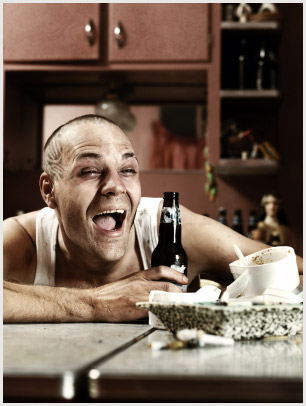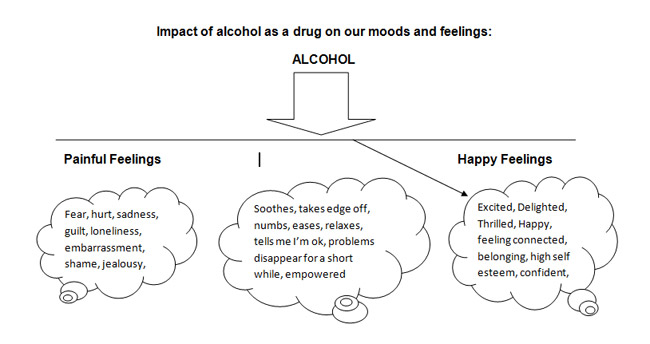How alcohol affects mood
 Impact of alcohol as a drug on our moods and feelings
Impact of alcohol as a drug on our moods and feelings
The reason alcohol is such a powerful drug is because it lifts mood and changes the way drinkers feel. Some research has looked at the factors that motivate people to consume alcohol (Kuntche et al 2005). They describe four categories of drinking motives of which drinkers may be conscious or unconscious:
- To enhance positive mood or well being
- To obtain social rewards (e.g. to make a party more enjoyable)
- To reduce pain/discomfort of negative emotions
- To avoid rejection socially
This same researcher reported that the majority of drinkers volunteer social motives (e.g. to make a party more enjoyable) as being associated with moderate drinking; drinking for coping purposes was associated with heavy drinking or binge drinking.
Brennan et al. (1986) examined motives for drinking in college students and identified two general types of drinking motives:
- Drinking for social purposes
- Drinking for emotional escape or coping purposes
- As well as motives, peoples’ expectancies of what alcohol can do for them can influence their drinking in both a positive (“drinking allows me to relax”) and negative way (“when I drink, I often say things that I regret later”).
Alcohol and our moods and feelings

Alcohol and Mood
The mood altering quality of alcohol may be used to let us:
- Express feelings
- Mask feelings
- Avoid feelings
Expressing feelings through alcohol
For a man or a woman, young or old, who by their nature or by their upbringing is not skilled or is held back in their ability to express their feelings, alcohol allows that expression. With inhibitions gone, someone can be the witty or playful person that their shyness normally prevents. The person lets themselves go, can laugh and chat, express opinions and argue a case, can dance and sing and not have to be on one’s guard about what to say or how to say it. Or alcohol may allow a person to express a long held grievance or sorrow that is real and runs deep and sore and badly needs to be spoken about. This may otherwise never break the surface of consciousness and just leave a person with a part of their life that is sore or sour and only ever expresses itself indirectly in moodiness or grumpiness or in always being negative.
Masking feelings through alcohol
For many reasons a person can be overloaded with feelings: anxiety, stress, the relentless emotional demands of family and work; simple tiredness and drudgery; unemployment, boredom and lack of shape and direction to our lives.
All may not be well with us but we do not want to complain. That would be moaning. We don’t want to admit our vulnerability and let ourselves down or worry those close to us. Alcohol allows us to relax and forget our cares for a while. To those who observe us socially, we may be easy going, relaxed, friendly and maybe even good “craic”. It is reassuring for us to be seen that way. The dangerous and harmful thing is that this person comes to use alcohol more and more to persuade themselves and those around them that all is well when it is not.
Avoiding feelings through alcohol
It is not an uncommon experience that we do not want to face up to unhappy or fearful situations, to make decisions about them or even think about them. Even thinking about them disturbs us and makes us feel bad. So we keep ourselves busy and distracted and don’t let ourselves think about things. We find it difficult to sit quiet and relax. Drinking can provide, not relaxation but a kind of escape to a numbed little world of our own.
This is why we have the person who drinks alone in a quiet anonymous pub; or the person who drinks alone at home, drinking until sleep comes and often waking up in the early hours of the morning in an armchair. For the person avoiding feelings this can become a regular feature of their drinking style.
Kuntsche E, Knibbe R, Gmel G, Engels R. (2005). Why do young people drink? A review of drinking motives. Clin Psychol Rev. 2005 Nov;25(7):841-61.
Brennan, A.F., Walfish, S. and AuBuchon, P. (1986a) Alcohol use and abuse in college students: I. A review of individual and personality correlates. Int. J. Addict. 21: 449-474
Brennan, A.F., Walfish, S. and AuBuchon, P. (1986b) Alcohol use and abuse in college students: Ii. social/environmental correlates, methodological issues, and implications for intervention. Int. J. Addict. 21: 475-493














